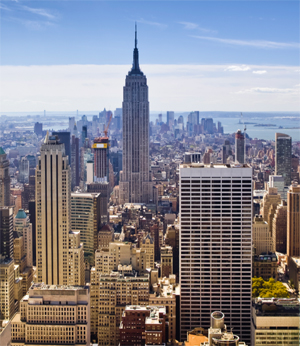
More than 2.3 million Latinos call New York City home. They live in every borough and every neighborhood in the city: from Jackson Heights to Washington Heights, from Parkchester to Port Richmond, from Sunset Park to Bedford Park. Over the course of several decades they have rebuilt communities, opened new businesses, changed the way we eat and speak, and become integral parts of the fabric of New York City. Now, more than ever before, you are as likely to hear New York City described not as the Big Apple but as La Gran Manzana.
Because Latinos now occupy such an important role in the daily life of the city, it is important that our political leadership understand and respond to the manifold challenges facing our community. This is an election year in New York and one that promises significant changes to the political landscape. Not only will we welcome new members of the City Council but also a new Comptroller, a new Public Advocate, and perhaps most significantly, a new Mayor.
As we have watched the electoral process unfold we have been heartened by the amount of attention that the candidates have been paying to Latino voters. But we worry also that while candidates may recognize the value of the Latino electorate, they may not fully grasp the scope of the challenges that Latino families, businesses and seniors face in New York City.
Hispanic Federation and its network of over 60 NYC member agencies are uniquely positioned to understand those challenges because we confront them each day. Through our network, we are able to dig deeply into communities and examine the ways in which government can best support the needs and aspirations of Latino New Yorkers. For decades now, we have worked with Latinos from every borough and every national origin to create policies and programs that empower and advance the Hispanic community.
In order to help the candidates for Mayor and all city government offices better understand the Latino community, we are proud to present La Gran Manzana: The Road Ahead for NYC’s Latino Community. This policy blueprint, compiled after extensive conversations with our community leadership, addresses the key issues facing Latino New Yorkers and offers common sense and practical solutions for improving their lives. Our hope is that this guide will not only help candidates formulate policy agendas that address issues that affect Latinos, but also serve as a starting point between the Hispanic Federation and our member agencies and the new leaders of La Gran Manzana.

We are at a critical juncture in New York City. Amid great challenges and opportunities, we are preparing to elect a new Mayor and City Council that will determine the future direction of this great metropolis. With Latinos constituting nearly a third of New York City’s population, the state of the Hispanic community must be of particular importance and focus for the city’s new Executive and Legislature. La Gran Manzana: The Road Ahead for NYC’s Latino Community is a policy blueprint designed to introduce current and prospective government officials to the key issues facing the Latino communities of New York City. It contains recommended reforms developed by HF policy staff, member agencies and partner advocacy institutions. As the city elects new political leadership, this blueprint can serve to inform how they address the opportunities and challenges facing New York’s growing Latino community.
Hispanic Federation and its network of Latino nonprofits – consisting of human service agencies, senior centers, day schools, theaters, community health clinics and immigrant and civil rights groups – have chosen to highlight nine focus areas that should be central to the policy and planning priorities of New York City’s next generation of government leaders. The points on the following page highlight each of those areas and summarize the key action steps laid out in this report.
- Supporting Latino Nonprofits: Establish a nonprofit stabilization fund, protect New York City Council Discretionary Aid, and reform the RFP process to strengthen the city’s human services infrastructure.
- Improving Education: Make greater investments in early childhood education and after-school programming, strengthen English Language Learners support services, prioritize college readiness and success, and significantly improve parent and community engagement.
- Supporting Healthy Lifestyles: Engage in proactive health education through schools and community- based organizations, and strengthen initiatives aimed at increasing Latino health care access and reducing health disparities.
- Integrating Immigrants: Support English instruction and immigration assistance programs, expand immigrant rights, and protect our vulnerable undocumented neighbors.
- Economic Empowerment and Financial Security: Drive city resources to create living wage jobs, expand workforce development training, create anti-poverty initiatives and significantly increase affordable housing units.
- Environmental Justice: Enact policies to reduce unfair environmental burdens on Latino neighborhoods and prepare for and respond to future climate-related disasters.
- Civil Rights: Protect all New Yorkers’ rights and pass reforms to stop profiling and prevent barriers based on race, ethnicity, English proficiency, gender, sexual orientation and religion.
- Women’s Rights: Increase economic opportunities, strengthen social safety net services, and protect the employment and reproductive rights of Latinas.
- Arts & Culture: Reform and increase cultural affairs funding to support Latino theaters, museums and arts organizations including smaller nonprofits.
These proposed reforms represent the collective wisdom of many of New York City’s best leaders and institutions. It is a valuable and necessary guide for meaningful debate on the future of our city and its Latino families, workers and institutions. It is our hope that this document will inform the priorities and decisions of the city’s political leadership in the months and years ahead. We know that the investments we make to strengthen the Latino community in each of these nine areas will yield huge results in every neighborhood of New York City for generations to come.

Across New York City, Latino nonprofit organizations provide critical and vital community services that implement and augment government assistance. For the most vulnerable members of society, our nonprofits are there with food for the hungry, shelter for our seniors, care for those living with HIV/AIDS, and refuge for victims of domestic violence. They provide job training, meals to seniors, health screenings, parenting skills workshops, and child care to assist low income working families. What is more, beyond providing important services to residents in our communities, these organizations serve as a vital source of employment and economic security for thousands of New Yorkers.
Unfortunately, many of our organizations are struggling to survive and meet the growing needs of the Latino community. Private philanthropy is less likely to provide support for necessary operating expenses. While Latinos comprise 28% of New York City residents, foundations and charitable giving to Latino nonprofits barely hits 2% of their total awards.
More problematic, however, is the growing instability and retracting of funding from New York City and other government sources. The City’s RFP process has become more complex, making it more difficult for smaller community-based organizations to compete for grants against larger, more established providers. And even when smaller groups do receive support through the competitive grants process, delays in payment place stress on weakened financial systems. Coupled with recent cutbacks and plans to dismantle desperately needed City Council discretionary funding, Latino nonprofits are closing their doors at a time when our community needs them the most.
The next Mayor and City Council can do a better job supporting our city’s human services infrastructure by implementing the following reforms:
- Create a $10 million Nonprofit Stabilization Fund to support people of color-led nonprofit organizations with core, operational infrastructure needs and technical assistance
- Award 10% of points in the Request for Proposal (RFP) process for organizations that demonstrate their capacity to provide culturally- competent and language-accessible services
- Diversify RFP Review Panels to ensure they include experts who understand our local community context and nonprofits, and reflect the diversity of the city
- Distribute funding according to more localized census tract data – not zip code clusters – to ensure geographically-small, high-poverty or dense Latino neighborhoods are sufficiently resourced
- Reform the city budget process by ending the “budget dance,” baselining vital human service initiatives, and speeding up timing on contract payments
- Preserve City Council Discretionary Funding to meet growing community needs and support smaller and locally-based organizations best equipped to respond to emerging trends
